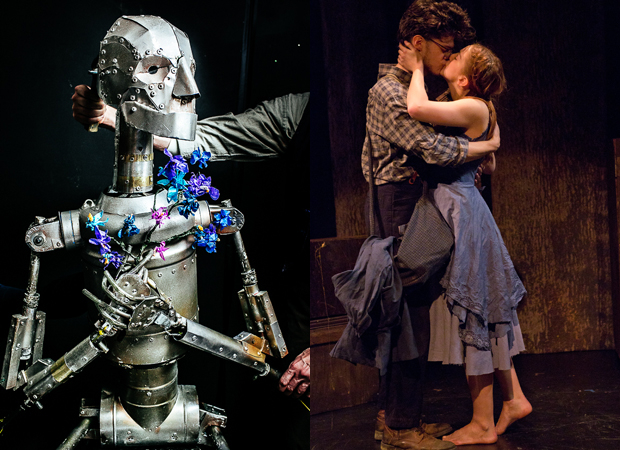The Woodsman Uses Folk Music and Puppetry to Tell the Tin Man's Enchanting Tale
Theater artist James Ortiz and professional violinist Edward W. Hardy talk about their “creatively fulfilling” collaboration for Strangemen & Co.
In Strangemen & Co.'s The Woodsman, now playing its first open run at New World Stages, audiences are treated to a completely original glimpse at L. Frank Baum's beloved Land of Oz. The dialogue-free production uses puppets, movement, and music (played throughout on a single violin) to tell the backstory of Oz's iconic Tin Man – a logger forced by an evil witch to cut off his own body parts with his ax rather than marry his sweetheart.
"It's an American fairy tale," writer, codirector, puppet creator, and lead actor James Ortiz told TheaterMania when we spoke about the show's engagement at 59E59 Theaters last year. "It's the only folk tale America has."
Oz's unique position within Americana is, in part, is what inspired Ortiz to bring on professional violinist Edward W. Hardy to compose and perform The Woodsman's folk-music score. But even after Hardy joined the Strangemen team, Ortiz continued to struggle with how to best tell the Tin Man's story.
As it became increasingly clear that the tale would be best served by movement and sound, Hardy, Ortiz, and the rest of the team were compelled to develop a language of sensory collaboration and eventually, put storytelling front and center.

(© Emma Mead/Hunter Canning)
How did The Woodsman come to be?
James Ortiz: The idea was, wouldn't it be interesting if we could do the Tin Man's story of man goes to machine and actually use puppetry to do that? We were just like, "How do we tell this?" We wrote some scenes and actually there was dialogue in it and it just wasn't working…And then Eddie came around and it became a thing where we would just sit in a room — and I don't know a thing about music — so I would be like, I think the feelings are…and the colors are…
Edward W. Hardy: So whenever he would say something like, "This scene is kind of terrifying," I would bring in a few themes that are kind of varieties of terrifying — very much or less much.
James: I remember the first day he was like, "You know I can't make this sound like an orchestra, right?"
Edward: My biggest fear, because it was just me, was how do I fill up the silence?
James: In very early rehearsals we had more scenes and more other things and he kept being like, "So am I going to play the whole show?" And it kind of turned into that. Everything else wasn't working.
Why do you think that was the case with this show?
James: With my type of puppetry, when the puppets themselves speak, you kind of kill the magic of the puppet a little bit. I think the thing that's extraordinary about puppetry is that it's participatory with the audience in the sense that my puppets don't really have moving features and it's the audience that perceives the expression changing. So we just pared it all back. What if it was more of a silent movie? And then we were trying to justify the choices, like, "Why is it silent? Can we make our villain more of a threat by making the world silent for a reason?" I'm really proud of the economy of the show. I feel like there isn't a wasted thing, like we've just got a tight little storytelling ball at this point.
What was the collaboration process like from the musical perspective?
Edward: It felt sort of like a relationship because after they'd solidify something, I would take it and work on it a lot and be like ,"OK! I have it!" and then come back in —
James: — and we'd have changed the scene.
Edward: It was fine. That's what happens. My teachers told me you're supposed to write more than they need just in case…so I'm glad.
What have you learned from this project?
Edward: I've played violin for sixteen years now and I always wanted my music to have a story. That's why this was so attractive to me. That's the one thing I've applied to all my other performances. I had this performance at a music festival where I played some Vivaldi, and all I kept picturing was the witch.
James: The way of working and the language that we found about how to communicate with each other…It just was one of the more creatively fulfilling experiences I've had.











